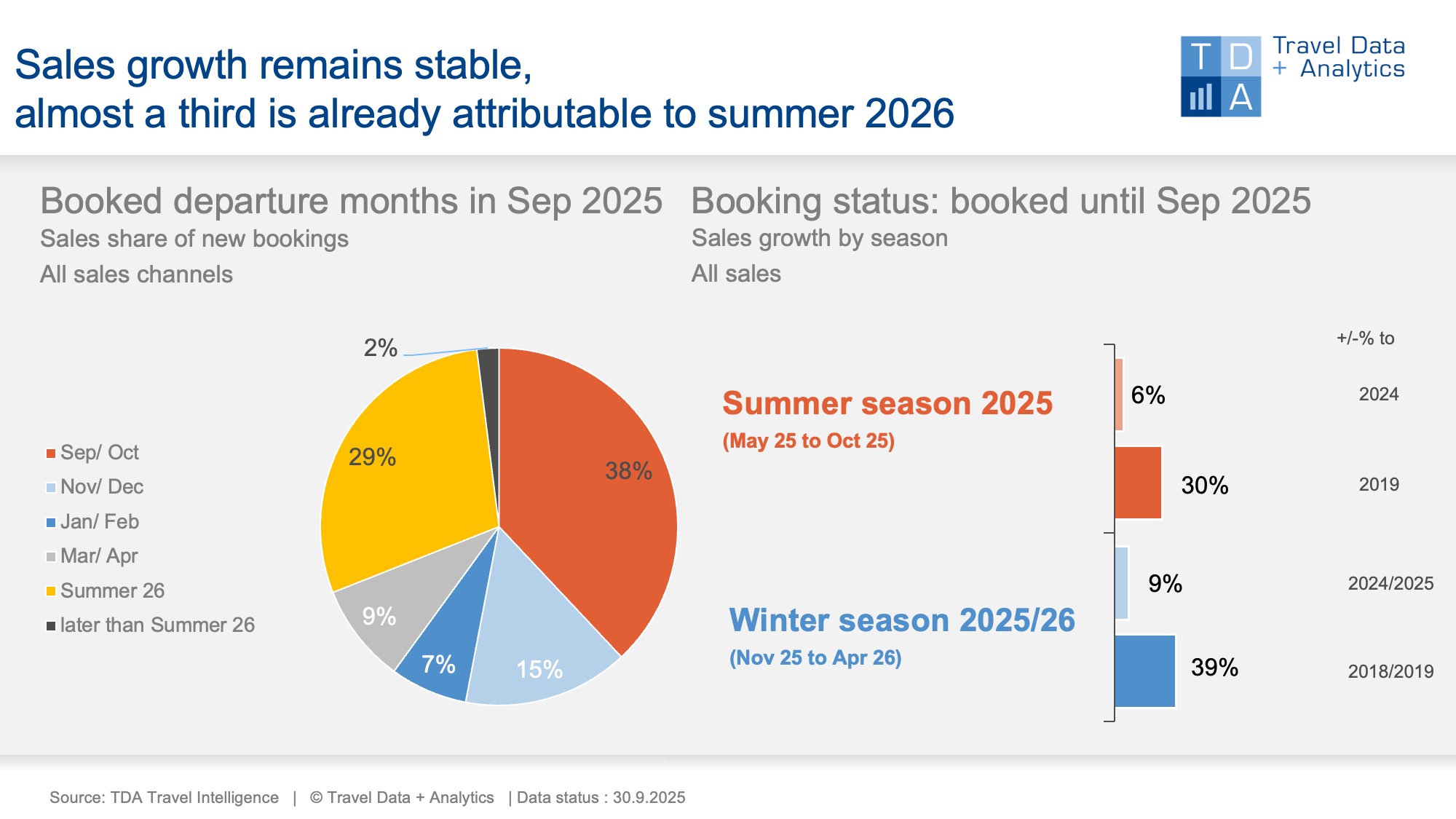Nuremberg, October 30, 2025 – The booking month of September 2025 ended with a 12 per cent increase in turnover in travel sales compared to the same month last year. This means that both the ongoing 2025 summer season and the upcoming 2025/26 winter season are maintaining the cumulative booking levels of the previous month, with increases of 6 per cent and 9 per cent in turnover respectively. In addition to strong demand for last-minute autumn holidays, bookings for winter holidays are picking up in September – and holiday bookings for the coming summer of 2026 are clearly on the rise.
Last-minute autumn holidays booked in September 2025 not only accounted for the largest share of sales at 38 per cent, but also showed good growth with an 8 per cent increase in sales compared to the same month last year. Most of this is attributable to the travel month of October, which is the autumn holiday period in most federal states except Bavaria: October alone accounts for a quarter of the monthly revenue booked in travel agencies or on traditional online travel portals. With strong demand for autumn holidays, the 2025 summer season, which runs until the end of October, is maintaining its 6 per cent lead in revenue. What's more, total revenue for the 2024 season has already been exceeded by almost 5 per cent based on current bookings.
Demand for winter holidays continues to rise: at 31 per cent, they account for just under a third of monthly sales in September. Compared to the previous month, this represents an increase of 5 percentage points – and with 6 per cent more sales compared to the same month last year, the upcoming 2025/26 winter season is also maintaining its level: As in the previous month, the new winter season shows cumulative sales growth of 9 per cent. Measured against total sales for the previous winter, a level of 49 per cent has now been reached (previous month: 41 per cent).
Early bookers, who are already securing their summer holidays for next year, are also showing strong growth: they have increased their sales by 24 per cent compared to last year. Together with early bookers for even later travel dates, they account for 31 per cent of September sales – the same amount as for the upcoming winter season. During the first two weeks of October, early bird sales for the 2026 summer season have already risen to 38 per cent of weekly new booking sales. German citizens' holiday interest is increasingly focused on the upcoming summer holidays.

Legend:
The chart shows the cumulative holiday bookings generated by the end of September 2025 for the next winter season 2025/2026 and the current summer season 2025 compared to the previous year. TDA's analysis includes holiday travel bookings in travel agencies as well as online on the travel portals of tour operators and online travel agencies (OTAs) with a focus on package holidays. The chart on the left shows the percentage of sales in the booking month of June accounted for by the individual travel months and seasons.
About TDA Travel Intelligence
Travel Data + Analytics (TDA) took over in spring 2019 the travel sales panel run by the Nuremberg market research company GfK since 2004. After the GfK data had been migrated to a new IT landscape, Travel Intelligence was set up as an independent solution with a self-learning database and associated analysis tool. The basis remains the booking data from stationary travel agencies and online portals that sell tour operator products. The requirements of tourism companies on a modern control instrument and evolving, increasingly dynamic questions can thus be mapped reliably and promptly, without giving up the core of a market-representative method that is consistently comparable over time. TDA = Current booking situation + individual product performance + new market opportunities.
Further information: Alexandra Weigand, alexandra.weigand@traveldataanalytics.de, phone: +49 (0)911 951 510 03